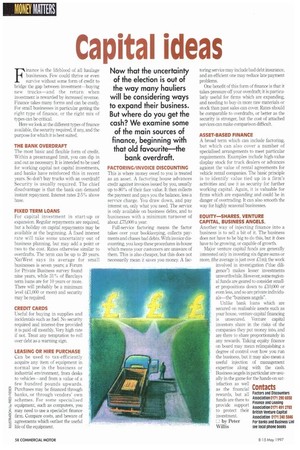Capital ideas
Page 60

If you've noticed an error in this article please click here to report it so we can fix it.
Now that the uncertainty of the election is out of the way many hauliers will be considering ways to expand their business. But where do you get the cash? We examine some of the main sources of finance, beginning with that old favourite—the bank overdraft.
Finance is the lifeblood of all haulage businesses. Few could thrive or even survive without some form of credit to bridge the gap between investment—buying new trucks—and the return when investment is rewarded by increased revenue. Finance takes many forms and can be costly. For small businesses in particular getting the right type of finance, or the right mix of types can be critical.
Here we look at the different types of finance available, the security required, if any, and the purpose for which it is best suited.
THE BANK OVERDRAFT The most basic and flexible form of credit. Within a prearranged limit, you can dip in and out as necessary. It is intended to be used for working capital not capital investments, and banks have reinforced this in recent years. So don't buy trucks with an overdraft! Security is usually required. The chief disadvantage is that the bank can demand instant repayment. Interest rates 2-5% above base.
FIXED TERM LOANS For capital investment in start-up or expansion. Regular repayments are required, but a holiday on capital repayments may be available at the beginning. A fixed interest rate will take some uncertainty out of business planning, but may add a point or two to the cost. Rates otherwise similar to overdrafts. The term can be up to 20 years. NatWest says its average for small businesses is seven years; a Forum for Private Business survey found nine years, while 31% of Barclays term loans are for 10 years or more. There will probably be a minimum level (f1,000 or more) and security may be required.
CREDIT CARDS Useful for buying in supplies and incidentals such as fuel. No security required and interest-free provided it is paid off monthly. Very high rate if not. Treat any temptation to roll over debt as a warning sign.
LEASING OR HIRE PURCHASE Can be used to tax-efficiently acquire any item of equipment in normal use in the business or industrial environment, from desks to vehicles—and from a value of a few hundred pounds upwards. Purchases may be financed through banks, or through vendors' own schemes. For some specialised equipment, such as computers, you may need to use a specialist finance firm. Compare costs, and beware of agreements which outlast the useful life of the equipment. FACTORING/INVOICE DISCOUNTING This is where money owed to you is treated as an asset. A factoring house advances credit against invoices issued by you, usually up to 80% of their face value. It then collects the payment and pays you the balance, less a service charge. You draw down, and pay interest on, only what you need. The service is only available on business debts, and to businesses with a minimum turnover of about £75,000 a year.
Full-service factoring means the factor takes over your bookkeeping, collects payments and chases bad debts. With invoice discounting, you keep these procedures in-house which means your customers are unaware of them. This is also cheaper, but this does not necessarily mean it saves you money A fac
toring service may include bad debt insurance, and an efficient one may reduce late payment problems.
One benefit of this form of finance is that ittakes pressure off your overdraft; it is particularly useful for firms which are expanding, and needing to buy-in more raw materials or stock than past sales can cover. Rates should be comparable to overdrafts, or better as the security is stronger, but the cost of attached services can make comparison difficult.
ASSET-BASED FINANCE A broad term which can include factoring, but which can also cover a number of specialised arrangements to meet particular requirements. Examples include high-value display stock for truck dealers or advances against the value of rental agreements for vehicle rental companies. The basic principle is to identify value tied up in a firm's activities and use it as security for further working capital. Again, it is valuable for firms which are expanding and could be in danger of overtrading. It can also smooth the way for highly seasonal businesses.
EQUITY—SHARES, VENTURE CAPITAL, BUSINESS ANGELS.
Another way of injecting finance into a business is to sell a bit of it. The business does not have to be big to do this, but it does have to be growing, or capable of growth.
Major venture capital funds are generally interested only in investing six-figure sums or more, (the average is just over Lim); the work involved in investigation ("due diligence") makes lesser investments unworthwhile. However, some regional funds are geared to consider smaller propositions down to £10,000 or even less, and so are private individuals—the "business angels".
Unlike bank loans which are secured on realisable assets such as your house, venture capital financing is unsecured. Venture capital investors share in the risks of the companies they put money into, and are there to share proportionately in any rewards. Taking equity finance on board may mean relinquishing a degree of control over how you run the business, but it may also mean a useful injection of management expertise along with the cash. Business angels in particular are usually in the game for the hands-on satisfaction as well as the financial rewards, but all funds are there to provide support to protect their investment.
Li by Peter Willis
Contacts
Factors and Discounters Association 0171 290 6938 Finance and Leasing Association 0171 491 1783 British Venture Capital Association 0171 240 3846 For banks and Business Lini see local phone books




























































































































